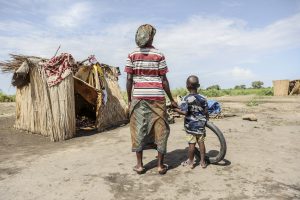Nigeria
Advocacy
In July, the Secretary-General published his fourth report on the situation of CAAC in Nigeria (S/2024/559), covering January 2022 to December 2023. During this period, the UN Country Task Force on Monitoring and Reporting (CTFMR) verified 2,519 grave violations against 1,250 children. The number of grave violations increased significantly compared to the previous reporting period (694). Abduction (1,105 children) remained the most prevalent violation, and in 2023, the number of abducted children (859) was the highest recorded since 2014. Recruitment and use (821) and sexual violence (439) also rose dramatically compared to the previous report. The surge in violations is partially attributed to increased access for verification, as well as mass defection of Jama’atu Ahlis Sunna Lidda’awati Wal-Jihad (JAS) members and their subsequent surrender to Government forces, which allowed children to escape captivity. JAS and ISWAP remain listed in the Secretary-General’s 2024 annual report for all five ‘trigger’ grave violations. The Working Group should:
- Strongly condemn all violations committed against children, and demand that all parties uphold their obligations under international humanitarian law (IHL) and human rights law (IHRL); urge all parties to end and prevent all grave violations against children, including an immediate cessation of all abduction, recruitment and use, and rape and sexual violence of children;
- Welcome child protection laws adopted in Borno, Adamawa, and Yobe States; and encourage strengthened accountability for perpetrators of grave violations, including rape and other forms of sexual violence, and support comprehensive, gender-sensitive, and age-appropriate response systems and services for child survivors of sexual violence;
- Welcome the adoption in September 2022 of handover protocol for children encountered in the course of armed conflict in Nigeria and the Lake Chad Basin Region; and call on the Government to ensure its full and consistent implementation and to endorse the Paris Principles and Commitments; reiterate to all parties that children affected by armed conflict should be treated primarily as victims, including those allegedly associated with armed groups designated as terrorist by the UN; their reintegration should be prioritized in line with international juvenile justice standards;
- Call on the Government and the Civilian Joint Task Force (CJTF) to continue sustaining gains made through implementation of the CJTF’s 2017 action plan and to swiftly implement its remaining provisions on trainings on children’s rights and establishing accountability mechanisms;
- Demand that all parties allow and facilitate the safe, unhindered delivery of humanitarian assistance to affected populations, especially children; and respect and protect humanitarian personnel, assets, and infrastructure.
This information is based on Watchlist’s Children and Armed Conflict Monthly Update – October 2024.
Partnerships
Following the listing of Boko Haram in the annexes of the UN Secretary-General’s 2014 annual report on children and armed conflict and the subsequent activation of the Monitoring and Reporting Mechanism (MRM) in Nigeria, Watchlist provided support via its Partnerships Program to promote local civil society engagement. In coordination with the UN Children’s Fund (UNICEF), Watchlist provided a training of trainers to a group of human rights defenders from Northeastern Nigeria; the training included sessions on UN Security Council Resolution 1612, NGO engagement with the MRM, the six grave violations, and methodology for documenting child rights violations. In a subsequent pilot project, participants conducted their own trainings on monitoring and reporting grave violations for other civil society representatives in conflict-affected regions.
Publications
UN Action
Year listed: 2014
Action Plans signed: Civilian Joint Task Force (CJTF) action plan to end and prevent the recruitment and use of children (September 2017)
Sanctions Committee: No
Secretary-General’s reports on CAAC in Nigeria: 2020; 2017
Security Council Working Group conclusions on Nigeria: 2020; 2017
Perpetrators listed in the annexes of the Secretary-General’s annual reports on children and armed conflict
| 2001 | 2002 | 2003 | 2005 | 2006 | 2007 | 2009 | 2010 | 2011 | 2012 | 2013 | 2014 | 2015 | 2016 | 2017 | |
|---|---|---|---|---|---|---|---|---|---|---|---|---|---|---|---|
| Boko Haram | b, d | a,b,d | a,b,d,e | a,b,c,d,e | |||||||||||
| Civilian Joint Task Force ~ | a | a |
a: Parties that recruit and use children
b: Parties that kill and maim children
c: Parties that commit rape and other forms of sexual violence against children
d: Parties that engage in attacks on schools and/or hospitals
e: Parties that engage in abduction of children
f: Parties that deny humanitarian access to children
~ This party has concluded an action plan with the United Nations in line with Security Council resolutions 1539 (2004) and 1612 (2005).
* This party has been in the annexes for at least five years and is therefore considered a persistent perpetrator.




